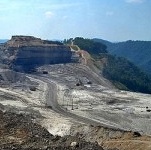Front Porch Blog
Updates from Appalachia

The War on Poverty at 50

On this day 50 years ago, President Lyndon Johnson sat on a front porch of a weary-looking eastern Kentucky home and declared war on poverty. At the time, one in three Appalachians were considered poor. The poverty rate in the region is now closer to the national average — 16.1 percent in Appalachia compared to 14.3 percent nationally — but, as you might suspect, those statistics tell only part of the story. Economic disparities between Appalachian counties and sub-regions remain high, and, as it was in 1964, eastern Kentucky remains a focal point.
The Gap Between Environmental Protection and DENR’s Skewed Self-perception

With the management of the N.C. Department of Environment and Natural Resources’ penchant for self-praise, the future must seem pretty bright. But beyond the narrative contrived in media releases, public criticism and displays of distrust in the agency’s direction have become commonplace in North Carolina’s largest newspapers and media outlets. And it’s making North Carolina’s environmental community stronger.
27 Visionaries: Stories of Regional Changemakers

When the battlefield on Blair Mountain was removed from the National Historic Register in 2009, West Virginia resident Doug Estepp was outraged. As the site of a landmark uprising of coal miners in 1921, Estepp reasoned that tourism centered around the state’s compelling history could be a source of sustainable economic diversification and also help raise awareness of the region’s stories and struggles. After Blair Mountain was delisted, Estepp decided that it was time to make that vision a reality.
For Patriot Coal, Ending Mountaintop Removal is a “Win-Win”

A little more than a year ago, Patriot Coal announced it would phase out its use of mountaintop removal coal mining in Appalachia as part of a settlement with environmental groups over selenium pollution. Taken at face value, statements made at that time by Patriot’s CEO Bennett Hatfield held promise that the movement against mountaintop removal, focused on exposing the poor economics as well as the irreversible environmental impacts of the destructive practice, had reached a pivotal turning point.
Changing Tides of Collaboration in Central Appalachia
For more than 15 years, Appalachian Voices has worked to protect the air, land and water of Central Appalachia. We do this work because the protection of the place we live is integral to the health, happiness and prosperity of our communities. We do this work for the benefit of all people in Central Appalachia.
Despite this, we often feel bogged down in contentious rhetoric that pits “treehuggers” against “friends of coal.” We often must spend all our time dealing with problems — water pollution, dust problems and violations of existing laws — when we’d much rather focus on collaboration and finding solutions.


